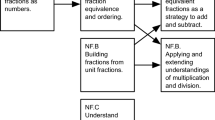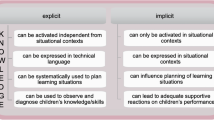Abstract
German pre-service teacher education aims to foster the concurrent formation of content knowledge, pedagogical knowledge, and pedagogical content knowledge. Accordingly, the coordination, sequencing, and prioritization of learning opportunities for the three areas of professional knowledge represent vital issues of the organization of teacher education at German universities. In this context, reanalyzing selected data of a previous experiment, we examined effects of instruction on pedagogical content knowledge about fractions in sixth-grade mathematics on the formation of corresponding content knowledge and generic pedagogical knowledge. Totaling 59 pre-service elementary school teachers, three groups had received seven hours of intervention on either content knowledge, pedagogical knowledge, or pedagogical content knowledge. Analyses of video recordings, ratings of treatment quality, and tests of professional knowledge revealed strong internal validity of the data. We found small effects of instruction on pedagogical content knowledge on the formation of both content knowledge and pedagogical knowledge. However, contrary to our expectations, effects on pedagogical knowledge were more consistent and statistically robust than effects on content knowledge. For the development of pedagogical knowledge in teacher education, this finding highlights the potential of parallel or integrated coursework, in which pre-service teachers use specific instructional strategies and student conceptions as examples to derive generic principles of teaching and learning.
Zusammenfassung
Das Lehramtsstudium in Deutschland zielt darauf ab, Fachwissen, fachdidaktisches Wissen und pädagogisches Wissen zu vermitteln. Entsprechend stellt die Koordinierung, Sequenzierung und Gewichtung von Lerngelegenheiten für diese drei Facetten des Professionswissens eine entscheidende Frage für die Organisation des Lehramtsstudiums dar. Vor diesem Hintergrund haben wir ausgewählte Daten eines früheren Experimentes reanalysiert, um Effekte fachdidaktischer Lehre zur Bruchrechnung der sechsten Jahrgangsstufe zur Bildung zugehörigen Fachwissens und generischen pädagogischen Wissens zu untersuchen. Drei Gruppen, mit insgesamt 59 Studierenden des Primarstufenlehramts, erhielten Interventionen von sieben Stunden in Fachwissen, pädagogischem Wissen oder fachdidaktischem Wissen. Auswertungen von Videoaufnahmen, Beurteilungen der Lehrqualität und Testungen des Professionswissens offenbarten eine starke interne Validität der genutzten Daten. Wir fanden kleine Effekte fachdidaktischer Lehre auf den Aufbau sowohl von Fachwissen als auch von pädagogischem Wissen. Entgegen unserer Erwartungen waren die Effekte auf pädagogisches Wissen allerdings konsistenter und statistisch besser abgesichert als die Effekte auf Fachwissen. Dieses Ergebnis hebt das Potential paralleler oder integrierter Kurse, in welchen Lehramtsstudierende konkrete Instruktionsstrategien und Schülervorstellungen als Beispiele zur Ableitung generischer Prinzipien des Lehrens und Lernens nutzen, für die Entwicklung pädagogischen Wissens im Lehramtsstudium hervor.


Similar content being viewed by others
References
Ball, D. L. (1991). Research on teaching mathematics: Making subject matter knowledge part of the equation. In J. Brophy (Ed.), Advances in research on teaching (Vol. 2, pp. 1–47). Greenwich: JAI.
Ball, D. L., Thames, M., & Phelps, G. (2008). Content knowledge for teaching. What makes it special? Journal of Teacher Education, 59, 389–407. https://doi.org/10.1177/0022487108324554.
Bates, D. M., Maechler, M., & Bolker, B. (2011). lme4: linear mixed effects models using S4 classes. R package version 0.999999–2.
Baumert, J., & Kunter, M. (2013). The COACTIV model of teachers’ professional competence. In M. Kunter, J. Baumert, W. Blum, U. Klusmann, S. Krauss & M. Neubrand (Eds.), Cognitive activation in the mathematics classroom and professional competence of teachers. Results from the COACTIV project (pp. 25–48). New York: Springer. https://doi.org/10.1007/978-1-4614-5149-5.
Baumert, J., Kunter, M., Blum, W., Brunner, M., Voss, T., Jordan, A., Klusmann, U., et al. (2010). Teachers’ mathematical knowledge, cognitive activation in the classroom, and student progress. American Educational Research Journal, 47, 133–180. https://doi.org/10.3102/0002831209345157.
Blömeke, S., Gustafsson, J.-E., & Shavelson, R. (2015). Beyond dichotomies: competence viewed as a continuum. Zeitschrift für Psychologie, 223, 3–13. https://doi.org/10.1027/2151-2604/a000194.
Brühwiler, C., & Blatchford, P. (2011). Effects of class size and adaptive teaching competency on classroom processes and academic outcome. Learning and Instruction, 21, 95–108. https://doi.org/10.1016/j.learninstruc.2009.11.004.
Bruner, J. S. (1966). Toward a theory of instruction. Cambridge: Belknap.
Clarke, D. M., & Roche, A. (2009). Students’ fraction comparison strategies as a window into robust understanding and possible pointers for instruction. Educational Studies in Mathematics, 72, 127–138. https://doi.org/10.1007/s10649-009-9198-9.
Cramer, K., & Bezuk, N. (1991). Multiplication of fractions: Teaching for understanding. The Arithmetic Teacher, 39, 34–37.
De Boeck, P., & Wilson, M. (Eds.). (2004). Explanatory item response models: a generalized linear and nonlinear approach. New York: Springer. https://doi.org/10.1007/978-1-4757-3990-9.
Depaepe, F., Torbeyns, J., Vermeersch, N., Janssens, D., Janssen, R., Kelchtermans, G., Verschaffel, L., et al. (2015). Teachers’ content and pedagogical content knowledge on rational numbers: a comparison of prospective elementary and lower secondary school teachers. Teaching and Teacher Education, 47, 82–92. https://doi.org/10.1016/j.tate.2014.12.009.
Depaepe, F., Verschaffel, L., & Kelchtermans, G. (2013). Pedagogical content knowledge: a systematic review of the way in which the concept has pervaded mathematics educational research. Teaching and Teacher Education, 34, 12–25. https://doi.org/10.1016/j.tate.2013.03.001.
Evens, M., Elen, J., Larmuseau, C., & Depaepe, F. (2018). Promoting the development of teacher professional knowledge: Integrating content and pedagogy in teacher education. Teaching and Teacher Education, 75, 244–258. https://doi.org/10.1016/j.tate.2018.07.001.
Gess-Newsome, J. (1999). Pedagogical content knowledge: An introduction and orientation. In J. Gess-Newsome & N. G. Lederman (Eds.), Examining pedagogical content knowledge (pp. 3–17). Boston: Kluwer. https://doi.org/10.1007/0-306-47217-1_1.
Gess-Newsome, J. (2015). A model of teacher professional knowledge and skill including PCK: Results of the thinking from the PCK summit. In A. Berry, P. Friedrichsen & J. Loughran (Eds.), Re-examining pedagogical content knowledge in science education (pp. 28–42). London: Routledge.
Gess-Newsome, J., Taylor, J. A., Carlson, J., Gardner, A. L., Wilson, C. D., & Stuhlsatz, M. A. M. (2017). Teacher pedagogical content knowledge, practice, and student achievement. International Journal of Science Education. https://doi.org/10.1080/09500693.2016.1265158.
Harr, N., Eichler, A., & Renkl, A. (2014). Integrating pedagogical content knowledge and pedagogical/psychological knowledge in mathematics. Frontiers in Psychology, 5, 1–10. https://doi.org/10.3389/fpsyg.2014.00924.
Harr, N., Eichler, A., & Renkl, A. (2015). Integrated learning: Ways of fostering the applicability of teachers’ pedagogical and psychological knowledge. Frontiers in Psychology, 6, 1–16. https://doi.org/10.3389/fpsyg.2015.00738.
Heinze, A., Dreher, A., Lindmeier, A., & Niemand, C. (2016). Akademisches versus schulbezogenes Fachwissen—Ein differenzierteres Modell des fachspezifischen Professionswissens von angehenden Mathematiklehrkräften der Sekundarstufe. Zeitschrift für Erziehungswissenschaft, 19, 329–349. https://doi.org/10.1007/s11618-016-0674-6.
Hill, H. C., Schilling, S. G., & Ball, D. L. (2004). Developing measures of teachers’ mathematics knowledge for teaching. The Elementary School Journal, 105, 11–30. https://doi.org/10.1086/428763.
Keller, M. M., Neumann, K., & Fischer, H. E. (2017). The impact of physics teachers’ pedagogical content knowledge and motivation on students’ achievement and interest. Journal of Research in Science Teaching, 54, 586–614. https://doi.org/10.1002/tea.21378.
Kleickmann, T., Großschedl, J., Harms, U., Heinze, A., Herzog, S., Hohenstein, F., Köller, O., et al. (2014). Professionswissen von Lehramtsstudierenden der mathematisch-naturwissenschaftlichen Fächer: Testentwicklung im Rahmen des Projekts KiL. Unterrichtswissenschaft, 42, 280–288.
Kleickmann, T., Tröbst, S., Heinze, A., Bernholt, A., Rink, R., & Kunter, M. (2017). Teacher knowledge experiment: Conditions of the development of pedagogical content knowledge. In D. Leutner, J. Fleischer, J. Grünkorn & E. Klieme (Eds.), Competence assessment in education: research, models and instruments (pp. 111–130). New York: Springer. https://doi.org/10.1007/978-3-319-50030-0_8.
König, J., Doll, J., Buchholtz, N., Förster, S., Kaspar, K., Rühl, A.-M., Strauß, S., et al. (2018). Pädagogisches Wissen versus fachdidaktisches Wissen? Struktur des professionellen Wissens bei angehenden Deutsch‑, Englisch- und Mathematiklehrkräften im Studium. Zeitschrift für Erziehungswissenschaft, 21, 611–648. https://doi.org/10.1007/s11618-017-0765-z.
König, J., Blömeke, S., Paine, L., Schmidt, W. H., & Hsieh, F.-J. (2011). General pedagogical knowledge of future middle school teachers: On the complex ecology of teacher education in the united states, Germany, and Taiwan. Journal of Teacher Education, 62, 188–201. https://doi.org/10.1177/0022487110388664.
Linninger, C., Kunina-Habenicht, O., Emmenlauer, S., Dicke, T., Schulze-Stocker, F., Leutner, D., Seidel, T., et al. (2015). Assessing teachers’ educational knowledge: Construct specification and validation using mixed methods. Zeitschrift für Entwicklungspsychologie und Pädagogische Psychologie, 47, 72–83. https://doi.org/10.1026/0049-8637/a000126.
Lohse-Bossenz, H., Kunina-Habenicht, O., Dicke, T., Leutner, D., & Kunter, M. (2015). Teachers’ knowledge about psychology: Development and validation of a test measuring theoretical foundations for teaching and its relation to instructional behavior. Studies in Educational Evaluation, 44, 36–49. https://doi.org/10.1016/j.stueduc.2015.01.001.
Magnusson, S., Krajcik, J., & Borko, H. (1999). Nature, sources and development of pedagogical content knowledge for science teaching. In J. Gess-Newsome & N. Lederman (Eds.), Examining pedagogical content knowledge (pp. 95–132). Boston: Kluwer. https://doi.org/10.1007/0-306-47217-1_4.
Mullis, I. V. S., Martin, M. O., Ruddock, G. J., O’Sullivan, C. Y., Arora, A., & Erberber, E. (2005). TIMSS 2007 assessment frameworks. Boston: TIMSS & PIRLS International Study Center.
Mullis, I. V. S., Martin, M. O., Ruddock, G. J., O’Sullivan, C. Y., & Preuschoff, C. (2009). TIMSS 2011 assessment frameworks. Boston: TIMSS & PIRLS International Study Center.
Oser, F., & Spychiger, M. (2005). Lernen ist schmerzhaft: Zur Theorie des Negativen Wissens und zur Praxis der Fehlerkultur. Weinheim: Beltz.
Padberg, F. (2009). Didaktik der Bruchrechnung. Heidelberg: Spektrum. https://doi.org/10.1007/978-3-8274-2257-6.
Park, S., & Oliver, J. S. (2008). Revisiting the conceptualisation of pedagogical content knowledge (PCK): PCK as a conceptual tool to understand teachers as professionals. Research in Science Education, 38, 261–284. https://doi.org/10.1007/s11165-007-9049-6.
Prediger, S. (2008). The relevance of didactic categories for analysing obstacles in conceptual change: Revisiting the case of multiplication of fractions. Learning and Instruction, 18, 3–17. https://doi.org/10.1016/j.learninstruc.2006.08.001.
R Core Team (2013). R: A language and environment for statistical computing. Vienna: R Foundation for Statistical Computing.
Reiser, B. J. (2004). Scaffolding complex learning: The mechanisms of structuring and problematizing student work. Journal of the Learning Sciences, 13, 273–304. https://doi.org/10.1207/s15327809jls1303_2.
Reiss, K., & Schmieder, G. (2005). Basiswissen Zahlentheorie: Eine Einführung in Zahlen und Zahlbereiche. Heidelberg: Springer.
Sadler, P. M., Sonnert, G., Coyle, H. P., Cook-Smith, N., & Miller, J. L. (2013). The influence of teachers’ knowledge on student learning in middle school physical science classrooms. American Educational Research Journal, 50, 1020–1049. https://doi.org/10.3102/0002831213477680.
Schalk, L., Saalbach, H., & Stern, E. (2016). Approaches to foster transfer of formal principles: Which route to take? PLoS ONE, 11, 1–21. https://doi.org/10.1371/journal.pone.0148787.
Schneider, R., & Plasman, K. (2011). Science teacher learning progressions: A review of science teachers’ pedagogical content knowledge development. Review of Educational Research, 81, 530–565. https://doi.org/10.3102/0034654311423382.
Seidel, T. (2014). Angebots-Nutzungs-Modelle in der Unterrichtspsychologie. Integration von Struktur- und Prozessparadigma. Zeitschrift für Pädagogik, 60, 828–844.
Shulman, L. S. (1987). Knowledge and teaching: Foundations of the new reform. Harvard Educational Review, 57, 1–23. https://doi.org/10.17763/haer.57.1.j463w79r56455411.
Siegler, R. S., & Lortie-Forgues, H. (2015). Conceptual knowledge of fraction arithmetic. Journal of Educational Psychology, 107, 909–918. https://doi.org/10.1037/edu0000025.
Tröbst, S., Kleickmann, T., Heinze, A., Bernholt, A., Rink, R., & Kunter, M. (2018). Teacher knowledge experiment: Testing mechanisms underlying the formation of preservice elementary school teachers’ pedagogical content knowledge concerning fractions and fractional arithmetic. Journal of Educational Psychology, 110, 1049–1065. https://doi.org/10.1037/edu0000260.
Van Driel, J. H., & Berry, A. (2010). The teacher education knowledge base: Pedagogical content knowledge. In B. McGraw, P. L. Peterson & E. Baker (Eds.), International encyclopedia of education (3rd ed., Vol. 7, pp. 656–661). Oxford: Elsevier.
Vosniadou, S., & Brewer, W. F. (1987). Theories of knowledge restructuring in development. Review of Educational Research, 57, 51–67. https://doi.org/10.3102/00346543057001051.
Voss, T., Kunter, M., & Baumert, J. (2011). Assessing teacher candidates’ general pedagogical/psychological knowledge: Test construction and validation. Journal of Educational Psychology, 103, 952–969. https://doi.org/10.1037/a0025125.
Voss, T., Kunter, M., Seiz, J., Hoehne, V., & Baumert, J. (2014). Die Bedeutung des pädagogisch-psychologischen Wissens von angehenden Lehrkräften für die Unterrichtsqualität. Zeitschrift für Pädagogik, 60, 184–201.
Wartha, S. (2009). Zur Entwicklung des Bruchzahlbegriffs: Didaktische Analysen und empirische Befunde. Journal für Mathematik-Didaktik, 30, 55–79. https://doi.org/10.1007/BF03339073.
Acknowledgements
The preparation of this paper was supported by grants KL 2355/1-1 and KU 1939/5-1 from the German Research Foundation (DFG) in the Priority Program “Competence Models for Assessing Individual Learning Outcomes and Evaluating Educational Processes” (SPP 1293).
Author information
Authors and Affiliations
Corresponding author
Rights and permissions
About this article
Cite this article
Tröbst, S., Kleickmann, T., Depaepe, F. et al. Effects of instruction on pedagogical content knowledge about fractions in sixth-grade mathematics on content knowledge and pedagogical knowledge. Unterrichtswiss 47, 79–97 (2019). https://doi.org/10.1007/s42010-019-00041-y
Published:
Issue Date:
DOI: https://doi.org/10.1007/s42010-019-00041-y
Keywords
- Pedagogical content knowledge
- Pedagogical knowledge
- Intervention
- Mathematics
- Elementary education
- Teacher education




